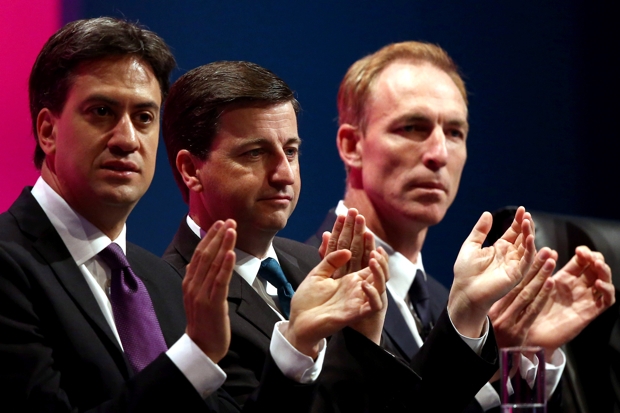I’ve written for the Scottish Daily Mail about Ed Miliband’s decision to rule out a coalition with the SNP no-one was seeking. It makes, I am almost embarrassed to say, the conventional argument. Ed epitomises the banality of mediocrity, his campaign is candy-floss disguised as cast-iron etc etc. The SNP have Labour on the run and all the rest of it. They know what they are doing; Labour does not.
All this may be true. But it’s always useful to step back and wonder if there might be a different view. Suppose, just for the sake of argument, Labour are actually in a better position than many people assume? Suppose, just for the sake of argument (if also, admittedly, in contravention of one of the iron laws of punditry) what’s happening now doesn’t continue to happen forever. Suppose things change. Suppose politics is not actually linear. What then?
Well, the argument for Labour being in a better position – and, thus, the argument for the SNP being in a weaker position than commonly assumed – might run something like this…
When coalition becomes the norm, if your vote isn’t for sale your vote is worthless. The SNP have said they won’t do a deal with the Tories (more on this anon) which leaves them with nowhere to go. Their vote isn’t for sale so their position is weaker than many people think. Consequently, their ability to influence events and extract concessions is reduced.
This assumes, granted, that Ed Miliband is able to form a government of some sort. But a minority government enjoys more security than sometimes supposed. The fixed-term parliament act has seen to that. The threat of dissolution and a fresh election is much reduced. So long as you can pass your Queen’s Speech you can govern.
Politics then becomes a game of chicken. Labour are betting, I think, that the SNP would never dare to bring down a minority Labour government. Because doing so would, most probably, put the Tories back into Downing Street.
I know it requires some cognitive creativity to imagine Ed Miliband as Michael Corleone but, nonetheless, his offer to the SNP is simple: his offer is nothing. To switch cinematic references, he points a Magnum at them and asks how lucky they feel. What are they going to do? Where can they go? In other words, the Tory poster is wrong: the SNP are in Miliband’s pocket, not the other way round. (And Labour are counting, I suspect, on the fact that swing voters in England don’t care who supplies confidence to a Labour government; just that it is able to govern.)
Either Labour and the Tories are just the same or they are not. Half the time the SNP insist there’s no great difference between the parties; then they say they can deal with Labour but not the Tories which, you know, kinda suggests the parties might just be different after all. I don’t know how many voters notice this contradiction but it exists even if voters don’t appreciate it.
Moreover, I think Labour probably think Nicola Sturgeon blundered yesterday when she endorsed the notion of voting SNP in Scotland, Plaid Cymru in Wales and the Greens in England. That’s a pretty strange way of getting a Labour government you reckon preferable to a Tory government. Which Green policies does she think so attractive? Permanent recession?
But what about the Tories? There are whispers – little more than that at present – that the Tories could offer the SNP a grand bargain in any post-election discussions. In return for supporting our Queen’s Speech, Osborne and Cameron (in that order) will say, you can have a bigger, better, Scotland bill that transfers more powers to Holyrood than those envisaged by the Smith Commission. (In return, of course, the number of Scottish MPs at Westminster would be further reduced. To, say, 30.) We win, you win, what’s not to like?
There are problems with this plan, not least that the Scottish Tories do not – as best I understand it – want to have anything to do with it. Nevertheless, they may not be in a position to greatly influence matters. Will they be in the loop or can they be sacrificed?
Hmmm.
If that’s how the cards fall, I dare say Jim Murphy can cope with the idea of running a campaign for next year’s Holyrood elections in which he would argue “The SNP put the Tories in power and claim they did it ‘For Scotland’. Come on.”
Now the SNP will likely say they wouldn’t countenance any such deal – there are risks attached, after all – but if it were a choice between getting some of what they want from the Tories or receiving nothing from Labour, well, things can change, can’t they?
That, in turn, would be a test of nerve for the Conservatives. A test of their Unionist credentials too. It would demand much more constitutional change – not just in Scotland but most probably everywhere else too – than is currently even being hinted at. I know there are some Tories thinking about these things – about how, effectively, a federal solution can be bodged together – but there’s a long way to go and much more work to be done.
Of course, none of this may come to fruition. Nevertheless, it is a reminder that the situation may be less certain than we sometimes think and that, for all it is tempting to concentrate on Unionist difficulties, the Nationalist position may not be as impregnable as it seems right now. Things do have a habit of changing and what seems to be happening now is no guarantee that things will continue to happen in this way.
Now, the conventional view may well still be correct but it’s worth questioning it anyway. Labour’s position may be a little stronger than it seems. I think they think they have boxed-in the SNP. Well, we’ll see, I guess.







Comments